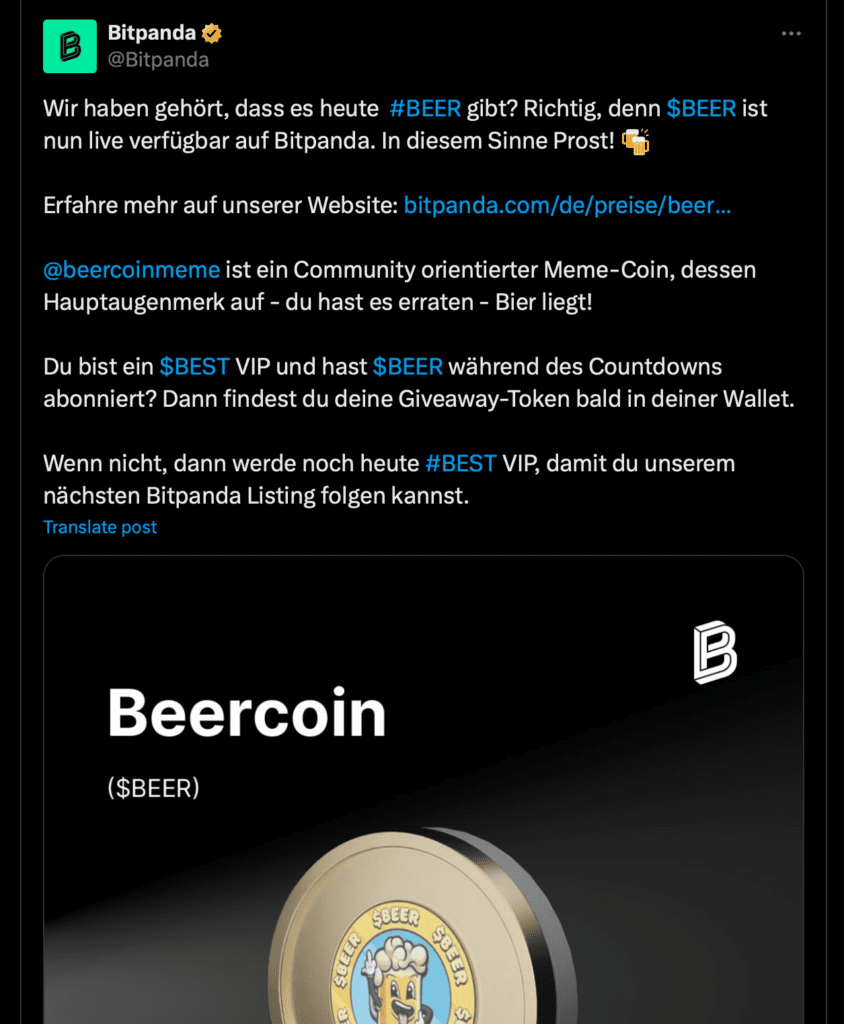In the dazzling world of cryptocurrencies, a troubling trend has emerged: more and more crypto exchanges are aggressively promoting the trading of so-called Meme Coins. These digital currencies, often based on internet memes and viral trends, pose significant risks to investors. A particularly concerning example is the $BEER coin, which various exchanges market as “liquid gold.” The active promotion of such highly speculative assets by crypto exchanges raises serious questions about their responsibility and ethical practices.
What are Memecoins?
Meme Coins are a category of cryptocurrency that is typically inspired by internet memes, jokes, or cultural phenomena. Unlike traditional cryptocurrencies like Bitcoin or Ethereum, which are designed to serve specific technological purposes or solve particular problems, meme coins are often created with no serious technical ambition or utility beyond their initial concept. Their primary value is driven by social media trends, community engagement, and the influence of online personalities.
A prominent example is Dogecoin, which started as a joke but quickly gained popularity. Other Memecoins like Shiba Inu, SafeMoon, and now $BEER followed suit, attracting numerous investors hoping for quick and high returns.
The Risks of Memecoins
- Extreme Volatility: Meme Coins are notorious for their extreme price fluctuations. While this volatility can offer opportunities for experienced traders, it poses a massive risk for inexperienced investors who often speculate on quick gains and end up suffering significant losses.
- Lack of Fundamental Value: Unlike established cryptocurrencies like Bitcoin or Ethereum, memecoins often lack solid fundamentals. They rely primarily on hype and speculation rather than technological advancement or real utility.
- Pump-and-Dump Schemes: Meme Coins are particularly susceptible to pump-and-dump schemes, where the price is artificially inflated, only to crash suddenly when the initiators sell their holdings. These practices regularly lead to significant losses for retail investors.
The Central Role of Crypto Exchanges
Crypto exchanges are the main players in the cryptocurrency market and play a crucial role in the popularization of Memecoins. The $BEER coin is a prime example of this problematic practice. Here are some especially concerning aspects:
- Enticing Trading Strategies: Exchanges like KUCOIN, BITPANDA, BYBIT, BINGX, GATE.IO, MEXC, and BITGET play a central role in popularizing $BEER. They market it as “liquid gold” and use eye-catching marketing campaigns to attract investors’ interest. These tactics amplify the hype around the coin and encourage speculative behavior among users.
- Insufficient Risk Disclosure: Many of these exchanges aggressively promote memecoins like $BEER without adequately informing their users about the significant risks involved. This leads to inexperienced investors unknowingly entering high-risk investments and potentially suffering large losses.
- Conflicts of Interest: Exchanges directly profit from the trading fees generated by buying and selling memecoins. These financial incentives could lead them to promote memecoins like $BEER to maximize their profits, even if it comes at the expense of the investors.
- Regulatory Risks: By promoting highly speculative assets like memecoins, exchanges could attract the attention of regulatory authorities. Some countries have already introduced stricter regulations for cryptocurrency trading to protect investors, and further regulatory actions could follow.
The Bitpanda Example
The Austrian crypto exchange Bitpanda, which is regulated by the FMA and BaFIN, is not afraid of Meme Coins either and is actively promoting #Beer via its X account, for example.

The uncritical promotion of Meme Coins like $BEER by crypto exchanges endangers the financial well-being of many investors and calls into question the integrity of the entire crypto market. These practices could lead to a loss of trust and hinder the long-term acceptance and development of cryptocurrencies.
Compliance View
The aggressive promotion of Memecoins like $BEER by crypto exchanges such as KUCOIN, BITPANDA, BYBIT, BINGX, GATE.IO, MEXC, and BITGET is highly problematic and exposes investors to significant risks.
From both a compliance and a risk perspective, we can only put Meme Coins on the red list. Meme Coins are not investments, but a form of online gambling.
While meme coins share some superficial similarities with Ponzi schemes, such as their speculative nature and reliance on hype, they are not inherently Ponzi schemes. The key distinction lies in the intent and structure of the investment. Legitimate Meme Coin projects operate transparently and do not promise guaranteed returns funded by new investors’ money. However, projects that engage in fraudulent activities or deceptive practices could face legal repercussions and potentially be classified as Ponzi schemes under certain circumstances.
Investors should exercise caution, conduct thorough due diligence, and be aware of the risks associated with speculative investments in Meme Coins. Regulatory bodies will continue to monitor and address any fraudulent activities within this space to protect investors and maintain market integrity.
The PayRate42 Stance
The PayRate42 team will review the crypto exchanges in the coming weeks to see whether they have implemented appropriate warnings for investors and traders for Meme Coins. In addition, we also expect a description of the KYC process with which the crypto exchanges check the issuers of Meme Coins. If such procedures are not easily recognizable, we will downgrade the crypto exchanges both in terms of compliance and risk.
Exchanges must take their responsibility towards users seriously and ensure that they are fully informed about potential dangers. Only through transparent communication and responsible practices can trust in the crypto market be strengthened and investors protected from substantial financial losses. Crypto exchanges urgently need to consider their role and responsibility to ensure short-term profits and the long-term stability and credibility of the entire market.
